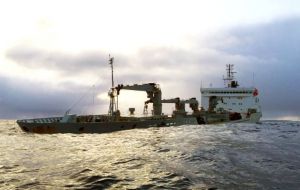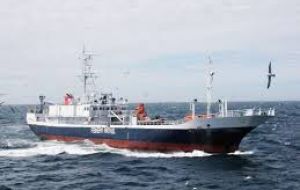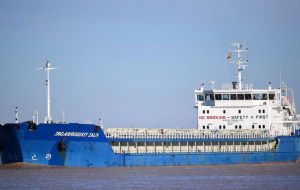MercoPress. South Atlantic News Agency
Falklands worried M/V Uruguay Reefer seems doomed to sink in the Islands Conservation Zones
 Baltmed Reefer Services Ltd. reported last Friday that cargo vessel MV Uruguay Reefer had sent a distress signal and reported severe flooding in the cargo holds.(Pic PN)
Baltmed Reefer Services Ltd. reported last Friday that cargo vessel MV Uruguay Reefer had sent a distress signal and reported severe flooding in the cargo holds.(Pic PN)  Falklands' Fishery Protection Vessel Protegat is in the scene because of the 560 tons of heavy fuel oil and 180 tons of marine gas oil the abandoned vessel is carrying
Falklands' Fishery Protection Vessel Protegat is in the scene because of the 560 tons of heavy fuel oil and 180 tons of marine gas oil the abandoned vessel is carrying  On Sunday the Master of the vessel decided to abandon ship as flooding could not be contained, and the 42 crew members were rescued by MV Taganrogskiy Zaliv
On Sunday the Master of the vessel decided to abandon ship as flooding could not be contained, and the 42 crew members were rescued by MV Taganrogskiy Zaliv The Falkland Islands Government (FIG) is closely monitoring the situation of the stranded M/V Uruguay Reefer and has been in contact with the vessel operators to impress upon them the need to find a solution which avoids the vessel sinking in Falkland Island Conservation Zones.
Falklands' Fishery Protection Vessel (FPV) Protegat has been in the scene since last Monday, and concern refers to the 560 tons of heavy fuel oil and 180 tons of marine gas oil the abandoned vessel is carrying, and is apparently doomed.
FIG also underlined in a release that it is not satisfied it was fully informed at the earliest stage possible of the condition of the vessel or the options for dealing with the vessel as they developed. MV Reefer Uruguay remains the responsibility of Baltmed Reefer Services Ltd. and it is for the company to minimize the potential environmental impact insists FIG, which is in discussion with the company on what further action should be taken.
The release points out that on Friday 5 May 2017, Baltmed Reefer Services Ltd. reported that the cargo vessel MV (Motor Vessel) Uruguay Reefer had sent a distress signal and reported severe flooding in the cargo holds.
On Sunday 7th May, the Master of the vessel decided to abandon ship as the flooding could not be contained, and the 42 crew members were transferred to the escorting vessel MV Taganrogskiy Zaliv without injuries. The MV Uruguay Reefer remained in the Falkland Islands Outer Conservation Zone (FOCZ), 96 miles south east from Stanley; this is just outside the Falkland Islands Interim Conservation and Management Zone (FICZ) and firmly inside the FOCZ. The MV Frio Las Palmas remained in the area to monitor the situation.
On Monday 8th May, The Fishery Protection Vessel (FPV) Protegat arrived at the scene and are currently monitoring the situation alongside the MV Frio Las Palmas. The crew on-board the MV Taganrorogskiy Zaliv are being repatriated to Montevideo in Uruguay. The MV Uruguayan Reefer remains in the current position in the FOCZ, and is drifting very slowly in a north-easterly direction.
The vessel is reported to have a nearly full cargo of frozen Illex squid and Krill and is also reported to have sustained hull damage whilst operating with Krill vessels around the South Shetland Islands, 75 miles north of the Antarctic Peninsula. Water entered one or more of the forward holds and initially on arrival in the FOCZ the vessel had a pronounced ‘bow down’ aspect. In the last day or so the vessel has leveled out, suggesting the flooding may be reaching further aft.
FIG has closely monitored the situation since the weekend and has been in contact with the vessel operators to impress upon them the need to find a solution which avoids the vessel sinking in Falkland Island Conservation Zones. The operators of the vessel have been evaluating options but have not come up with a solution yet, and it is likely that the vessel will sink near its current location.
The vessel is reported to have some 560 tones of heavy fuel oil and 180 tons of marine gas oil on-board which FIG believes may cause some localized pollution and contamination if the vessel sinks. The water depth in the vicinity of the MV Uruguay Reefer is some 1500m. If the vessel sinks in that area the environmental impact is likely to be limited.
Much of the fuel on-board will be contained in the vessel. The water temperature at the seabed in that area is around 2.5ºC and the heavy fuel oil will become highly viscous to the point of being a semisolid.
The Falkland Islands Government is not satisfied that it was fully informed at the earliest stage possible of the condition of the vessel or the options for dealing with the vessel as they developed.
The MV Reefer Uruguay remains the responsibility of Baltmed Reefer Services Ltd. and it is for them to minimize the potential environmental impact in the first instance. FIG is in discussion with the company on what further action should be taken.
The Falklands Islands Interim Conservation & Management Zone (FICZ) refers to the fishing zone up to 150 miles from the centre point of Falklands Sound. The Falkland Islands Outer Conservation Zone extends to 200 miles from the coast of the Falklands and is the deep water fishing zone.
In the event that it sinks, there will be short term localized pollution as the vessel sinks. This will most likely be the lighter fuel which will evaporate to some extent and be broken up by mechanical action: waves, wind and if need be vessels in the area. It will not be recoverable or amenable to dispersants. That is largely due to the characteristics of the oil and due to the location.
FIG is in discussion with the Environmental Planning Department, the Fisheries Department, Falklands Conservation, and the South Atlantic Environmental Research Institute on this.
In the longer term there may be sporadic pollution events as fuel/oil escapes from the vessel but they are likely to be minor in impact and rarely observed in that area. Due to most of the fuel/oil being contained in the vessel pollution or contamination in the area is likely to be limited. An exclusion area around the wreck can be implemented for a period and monitoring can be put in.




Top Comments
Disclaimer & comment rulesCommenting for this story is now closed.
If you have a Facebook account, become a fan and comment on our Facebook Page!